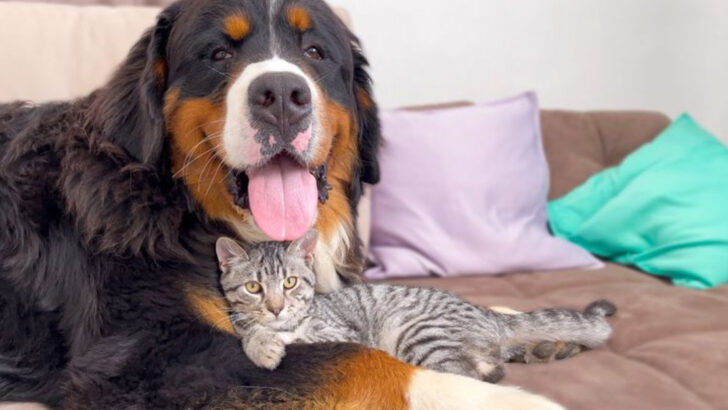Some dogs see a cat and think, “friend.”
Others think, “chase.”
Bringing dogs and cats together under the same roof can be a beautiful friendship—or a total disaster. It all comes down to the breed, the temperament, and yes, a little luck.
Some pups are practically born with a peace treaty in their paws. Others? Not so much. Their instincts scream predator, and your cat becomes an unwilling game of tag.
If you’re dreaming of harmony between whiskers and wagging tails, you’ve got to know who plays nice—and who can’t help but stir up chaos. This guide gives you the honest truth about 15 breeds that struggle with feline roommates and 12 that shine in multi-species households.
Chihuahua

Despite their petite size, Chihuahuas often possess a bold demeanor. Their feisty nature can sometimes clash with the independent attitude of cats. However, with early socialization, these tiny dogs can learn to share their space amicably.
A Chihuahua’s lively character means they are often vocal, which can be unsettling for a cat unaccustomed to constant barking. Patience and gentle introductions can ease this transition.
Fun fact: Chihuahuas are one of the oldest dog breeds in the Americas, believed to have been companions to ancient civilizations.
Dachshund
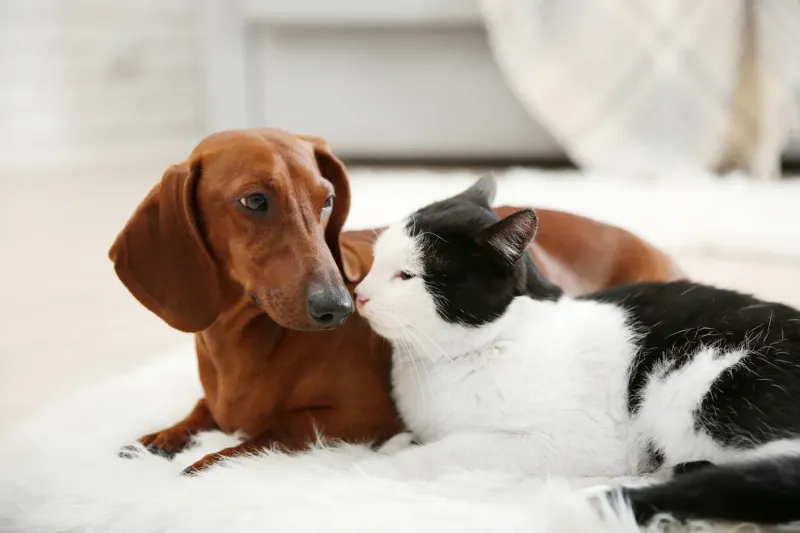
The Dachshund’s hunting instincts make them natural chasers, which may not bode well for a cat in the same home. Their determination, once focused on a chase, can be overwhelming for a feline.
Yet, with proper training, this breed’s playful nature can lead to unexpected friendships. While they may struggle initially, patience can bridge gaps.
Did you know? Dachshunds were originally bred to hunt badgers, which explains their strong prey drive and fearless disposition.
Bulldog
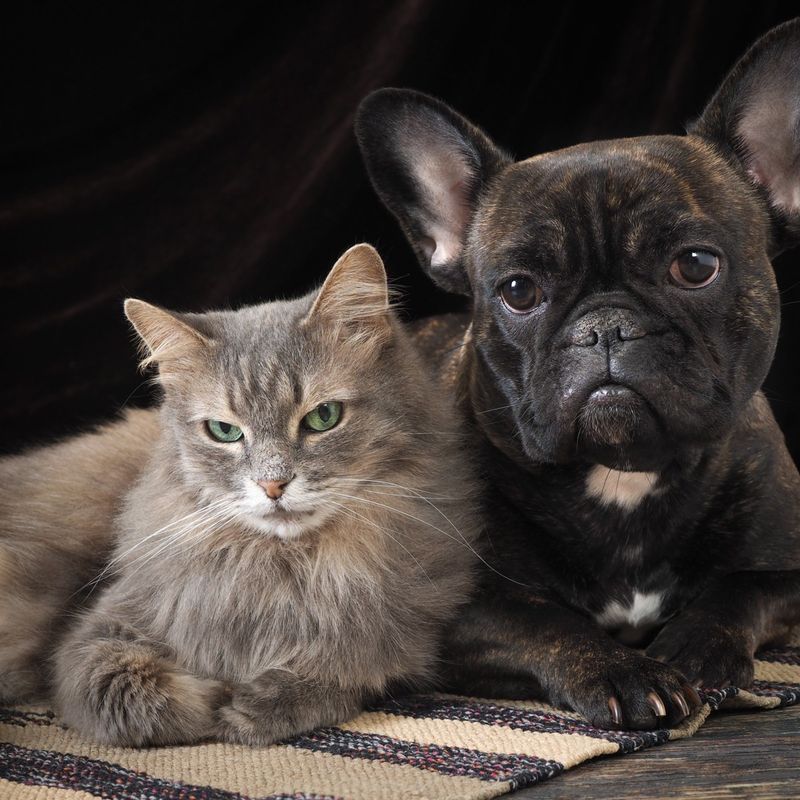
Bulldogs are known for their calm, laid-back attitude, making them one of the dog breeds that often get along with cats. Their gentle disposition contrasts with their robust appearance.
While Bulldogs may not be the most energetic playmates, they often enjoy the quiet company of a feline friend. Their affectionate natures complement the similarly relaxed demeanor of many cats.
Fun fact: Bulldogs were originally bred for bull-baiting, but today they are cherished for their affectionate and loyal nature.
Border Collie
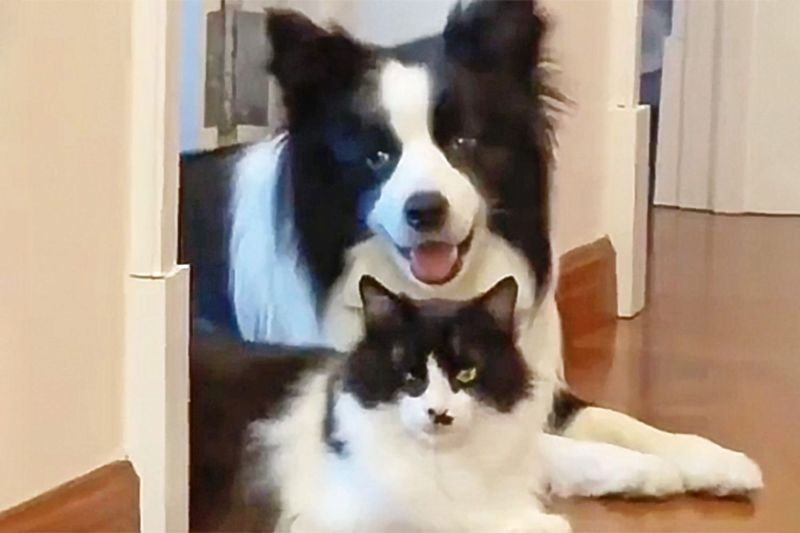
Highly intelligent and energetic, Border Collies are natural herders. Their instinct to round up anything that moves, including cats, can lead to tension in a shared home.
These dogs require mental stimulation and physical exercise, which may not align with a cat’s lifestyle. Still, with proper training and boundaries, they can learn to respect their feline companions.
Fun fact: Border Collies are considered one of the smartest dog breeds, originally bred for herding sheep in the Scottish borders.
Beagle

Known for their excellent sense of smell and inquisitive nature, Beagles often follow their noses rather than their hearts. This trait might lead to curious interactions with cats.
Beagles are social creatures, and with proper introduction, they can form bonds with feline housemates. Their friendly nature can outweigh their initial curiosity.
Fun fact: Beagles were originally bred for hunting small game, which explains their instinctive urge to explore and sniff out new scents.
Yorkshire Terrier
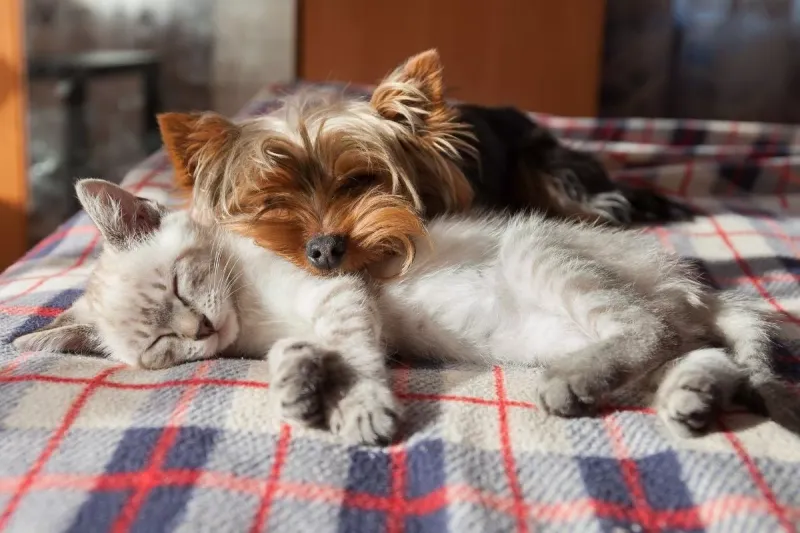
Yorkshire Terriers pack a lot of personality into their small frames. Their adventurous spirit can sometimes be too much for a cat to handle, particularly if not introduced properly.
Yet, their charming nature often wins over feline friends. With patience, Yorkies can learn to respect a cat’s space, creating a playful and dynamic duo.
Fun fact: Yorkies were initially bred to catch rats in mines, which reflects their tenacious and lively character.
Siberian Husky
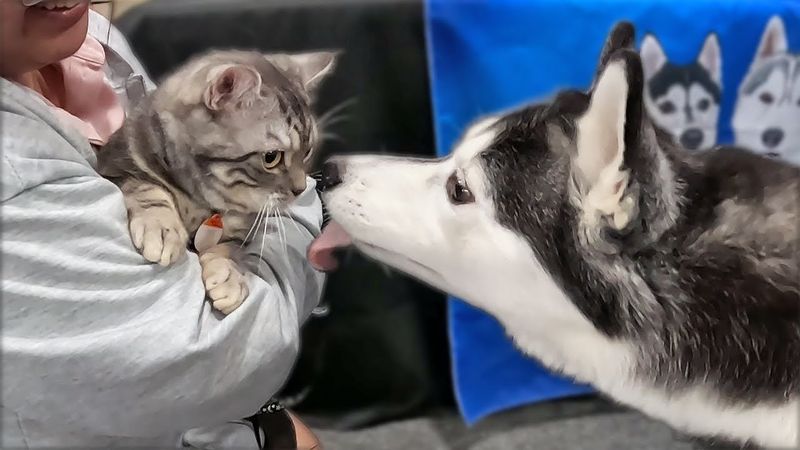
Siberian Huskies are known for their high energy and pack mentality. Their playful antics can seem overwhelming to a solitary cat unaccustomed to such vigor.
Despite their strong prey drive, Huskies can coexist with cats if raised together and given clear boundaries. Their friendly yet mischievous nature can lead to unique interspecies play.
Fun fact: Huskies were originally bred by the Chukchi people for sled-pulling and companionship in the harsh Siberian climate.
Basset Hound
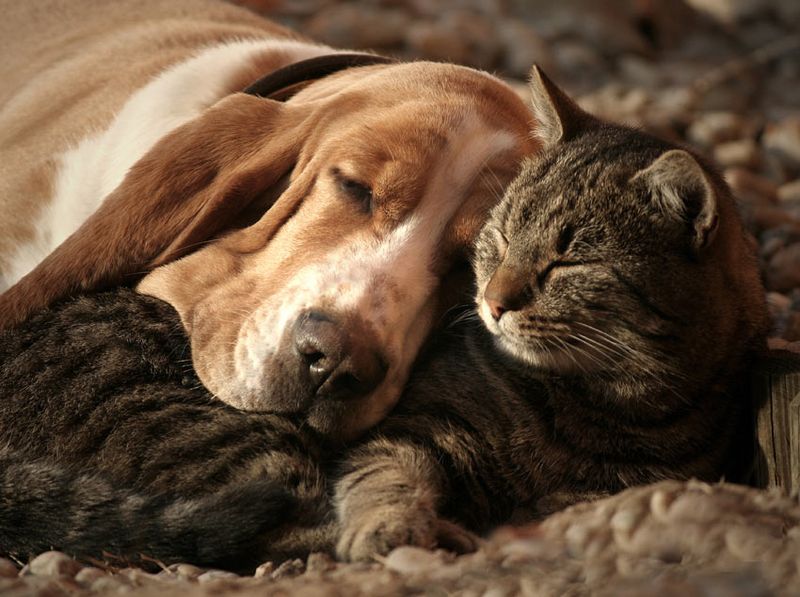
With their relaxed demeanor and affectionate nature, Basset Hounds often get along well with cats. Their calm presence is usually soothing rather than threatening to feline companions.
Although they are not overly playful, Basset Hounds enjoy companionship and can form close bonds with cats. Their gentle disposition makes them ideal for multi-pet households.
Fun fact: Basset Hounds have an incredible sense of smell, second only to the Bloodhound, which makes them excellent scent trackers.
Jack Russell Terrier
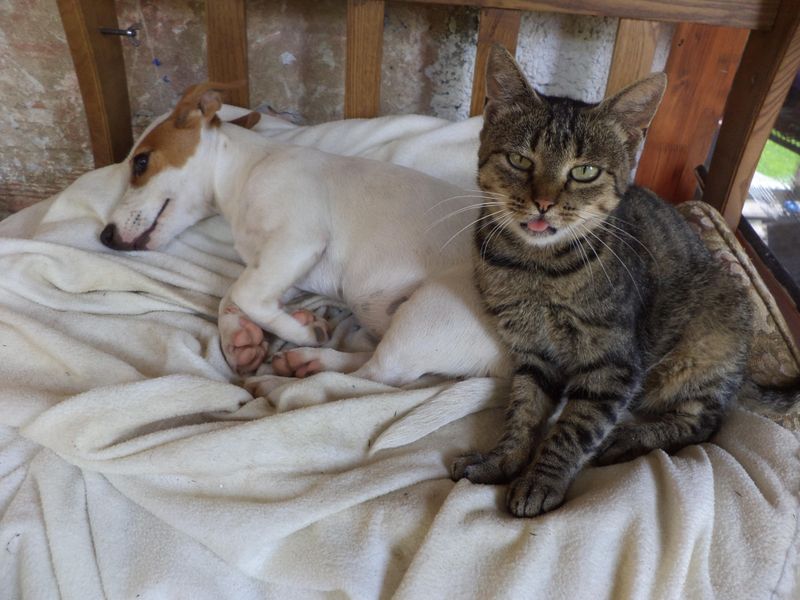
Known for their energetic and spirited nature, Jack Russell Terriers may find it challenging to coexist with cats. Their high prey drive often leads to chasing, which can stress feline friends.
However, with an outlet for their energy and proper training, these terriers can learn to live harmoniously with cats. Their intelligence and playfulness can become sources of joy.
Did you know? Jack Russells were bred for fox hunting, which explains their keen instincts and boundless energy.
Cavalier King Charles Spaniel
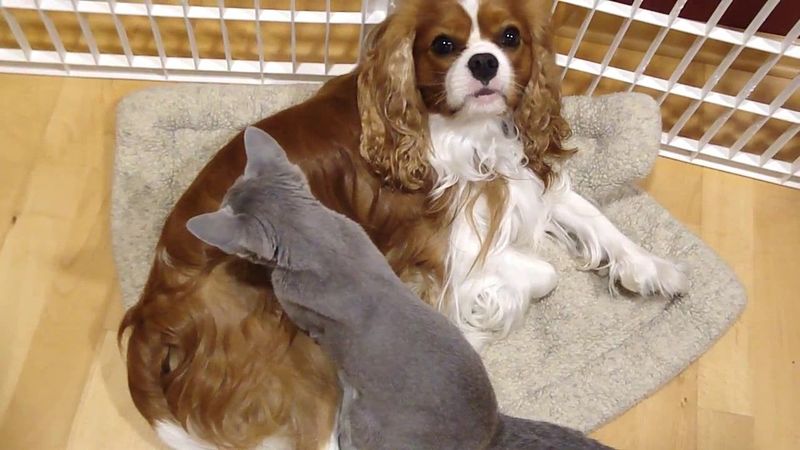
Cavalier King Charles Spaniels are known for their affectionate and easygoing nature. These traits make them excellent companions for cats, often forming gentle and loving relationships.
Their friendly disposition allows them to integrate well into a multi-pet household, where they can coexist peacefully with feline friends.
Fun fact: These dogs were named for King Charles II of England, who was known for his love of the breed, often keeping them as royal companions.
Pomeranian
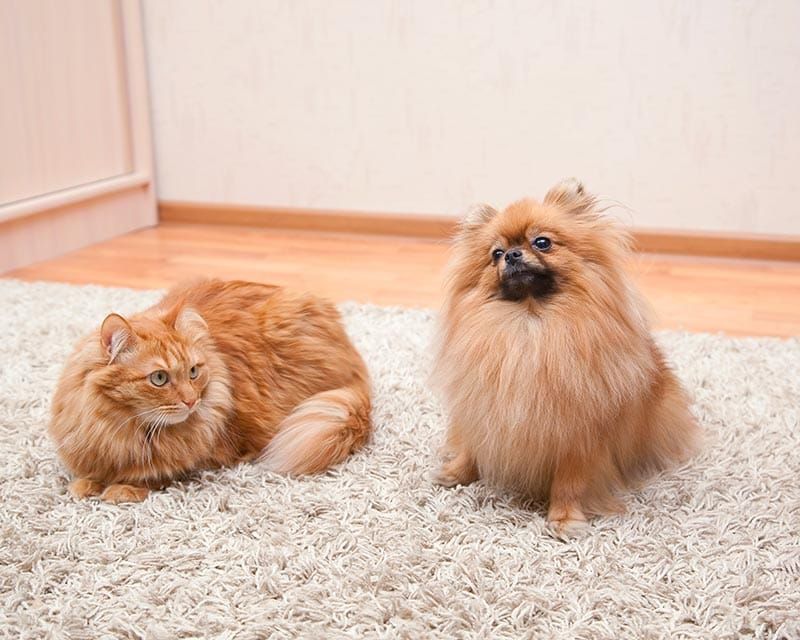
Pomeranians, with their bold and lively personalities, can be a handful for some cats. Their small size belies a big attitude, which can sometimes overwhelm more reserved feline companions.
Yet, with proper socialization, Pomeranians can adapt and learn to coexist peacefully. Their playful nature, when well-managed, can lead to delightful interactions.
Did you know? Pomeranians are descendants of large sled dogs from the Arctic, but were bred down to their current size in the Pomerania region of Europe.
Shih Tzu
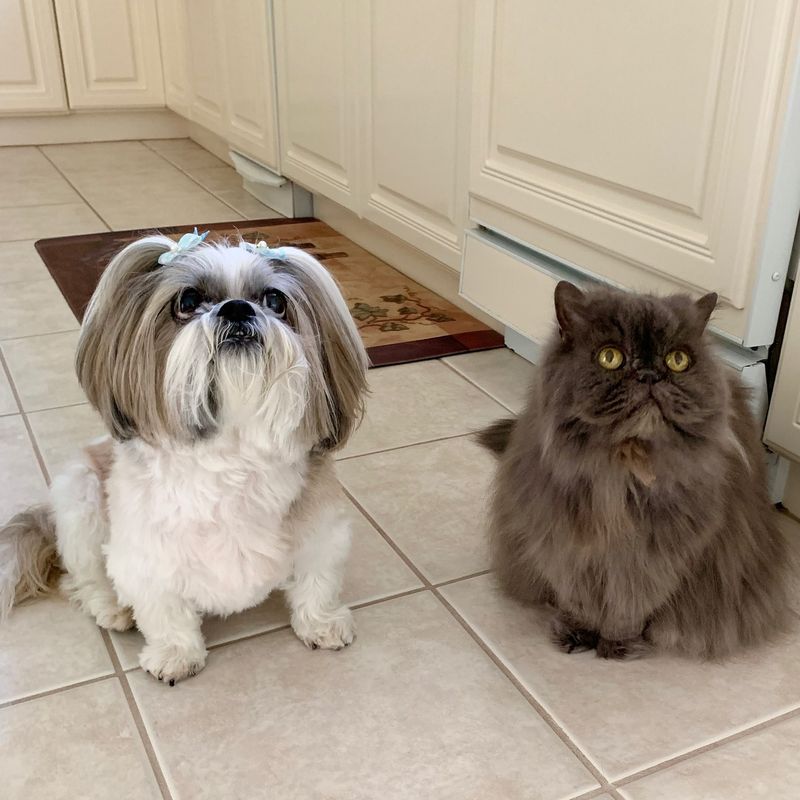
Known for their friendly and tolerant character, Shih Tzus often thrive in a home with cats. Their calm demeanor complements a cat’s independent nature, often leading to shared companionship.
While they enjoy the company of their human and feline friends, Shih Tzus are also content lounging in comfort, making them ideal housemates for cats.
Fun fact: Shih Tzus were bred to resemble lions, a revered symbol in Buddhism, and were cherished companions in Chinese royal courts.
Golden Retriever

Golden Retrievers are renowned for their friendly and tolerant personalities, making them ideal companions for cats. Their gentle nature and love for play often translate into harmonious relationships.
These dogs are known for their patience, which can help smooth the introduction to a new feline friend. Many cat-dog duos thrive with a Golden Retriever’s companionship.
Did you know? Golden Retrievers were originally bred in Scotland for retrieving game during hunts, prized for their intelligence and eagerness to please.
Labrador Retriever
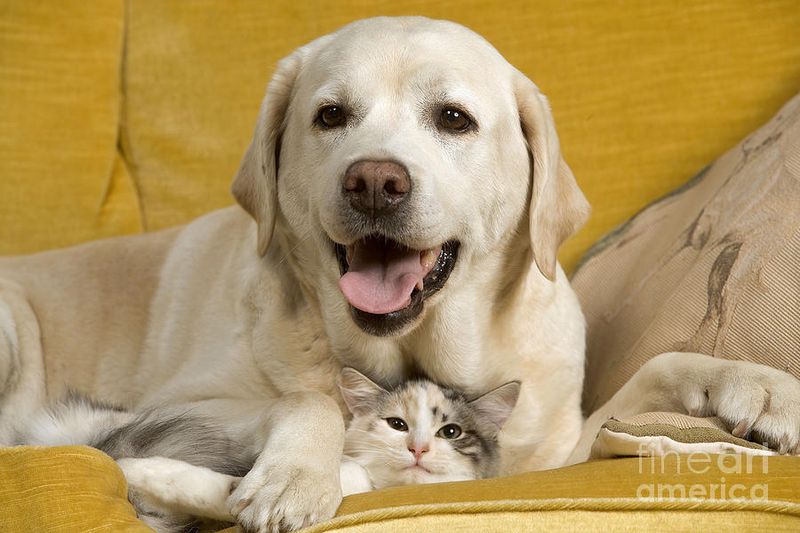
Labrador Retrievers are known for their friendly and outgoing nature, traits that often lead to successful cohabitation with cats. Their easygoing disposition makes them adaptable companions.
These dogs are eager to please and are generally accepting of feline housemates. With gentle introductions, a Labrador can become a beloved part of a multi-pet family.
Fun fact: Labradors are one of the most popular dog breeds worldwide, known for their versatility as family pets, service animals, and working dogs.
Boxer
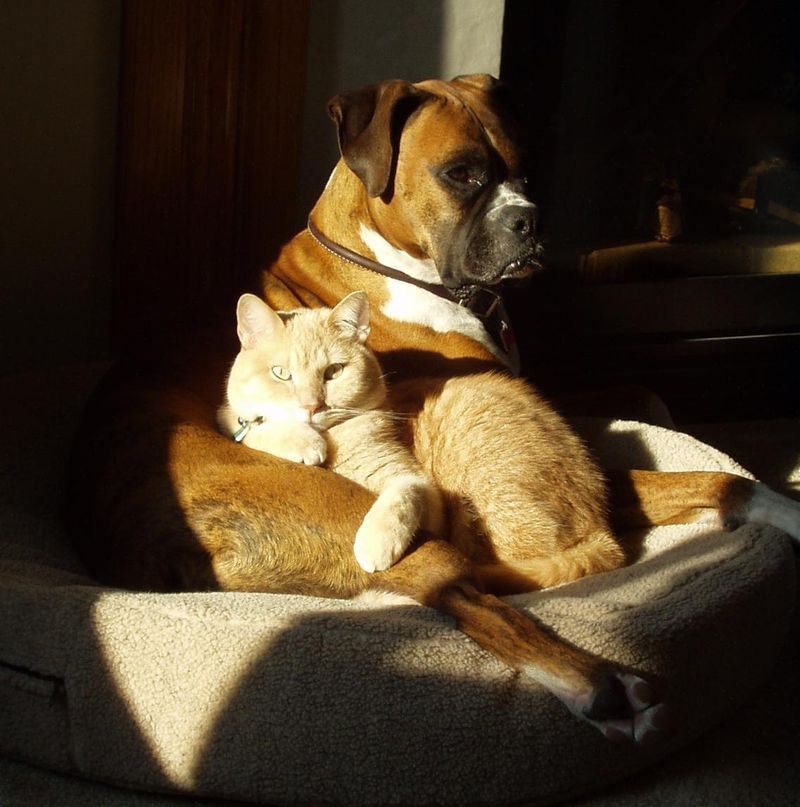
Boxers are full of energy and playfulness, traits that can lead to both fun and chaos when living with a cat. Their exuberance can sometimes overwhelm, but their affectionate nature can win over feline friends.
With proper training and supervision, Boxers can learn to coexist happily with cats, merging their vibrant personalities into harmonious household dynamics.
Did you know? Boxers were originally bred in Germany for bull-baiting, showcasing their strength and spirited nature.
Rottweiler
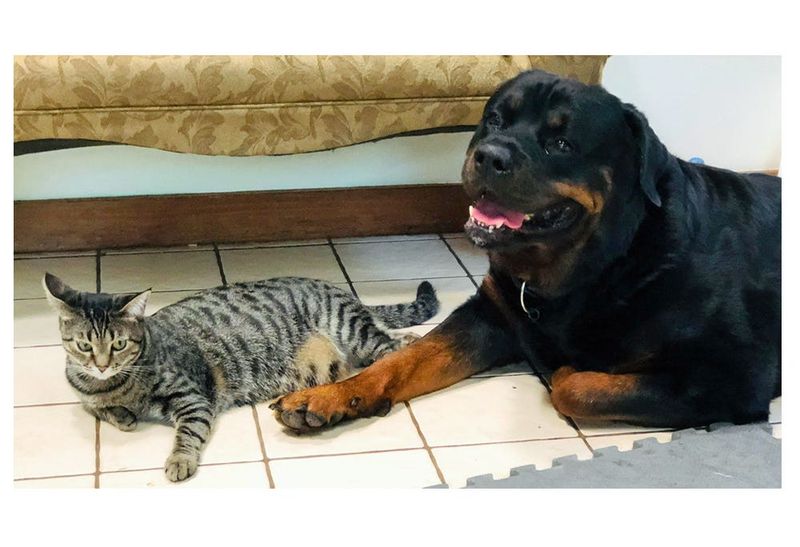
Rottweilers, with their protective instincts, may initially seem intimidating to cats. However, their loyal and calm nature can lead to unexpected friendships.
These dogs, when well-socialized, often form strong bonds with their feline counterparts, providing a sense of security within the home.
Fun fact: Rottweilers were originally used as herding dogs and cart-pullers in Germany, known for their strength and reliability.
Maltese
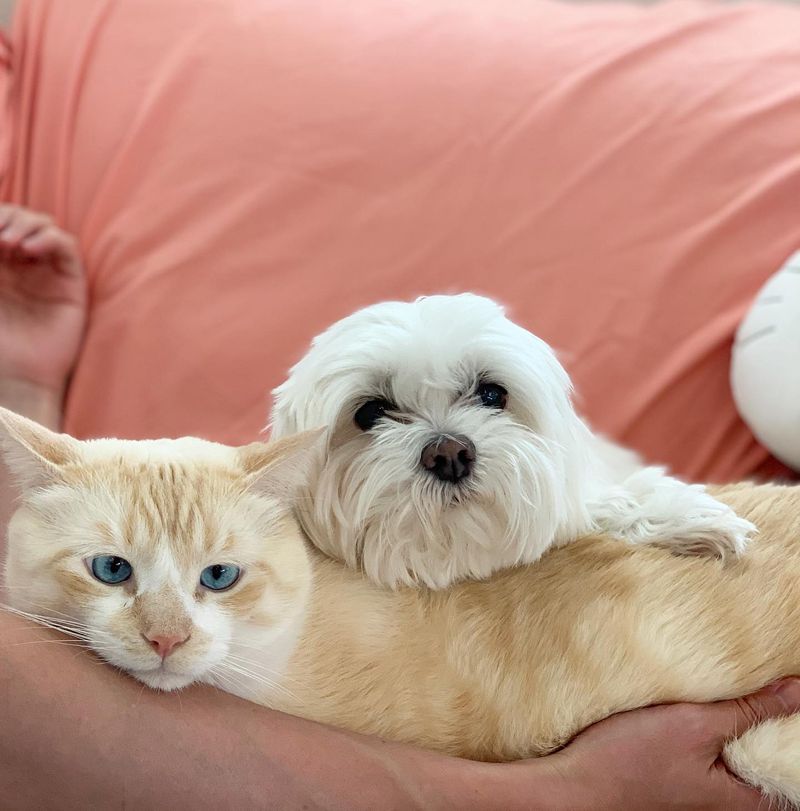
Maltese dogs are known for their gentle and affectionate nature, making them excellent companions for cats. Their small stature and friendly demeanor often lead to peaceful coexistence.
These dogs thrive on companionship and can easily adapt to life with a feline friend, enjoying shared naps and quiet moments together.
Fun fact: Maltese dogs have been cherished companions for royalty throughout history, often seen as symbols of luxury and elegance.
Pug
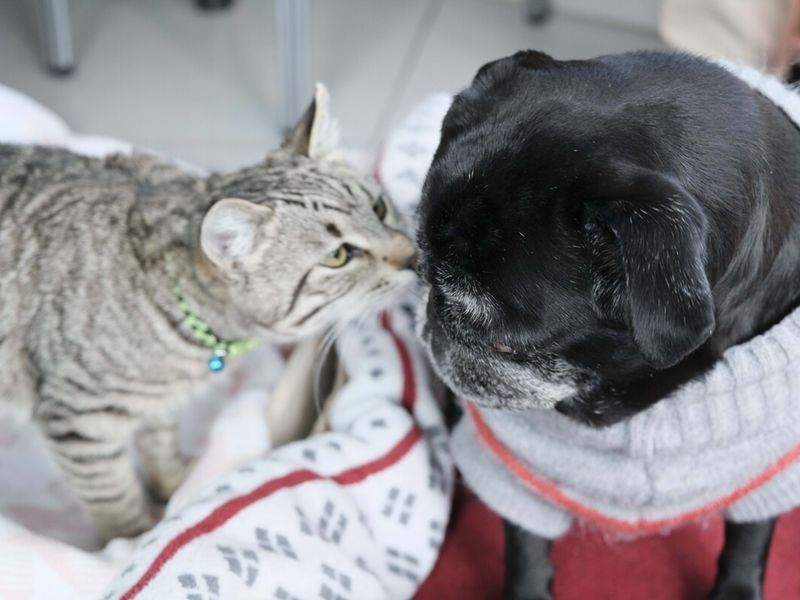
Pugs are known for their charming and sociable nature, qualities that often make them great companions for cats. Their laid-back attitude can lead to a harmonious living situation.
These dogs are typically friendly and curious, often engaging in gentle play with feline housemates. Their humorous antics can bring joy to a multi-pet household.
Did you know? Pugs have a long history as companions to Chinese royalty, prized for their wrinkly faces and affectionate personalities.
Boston Terrier
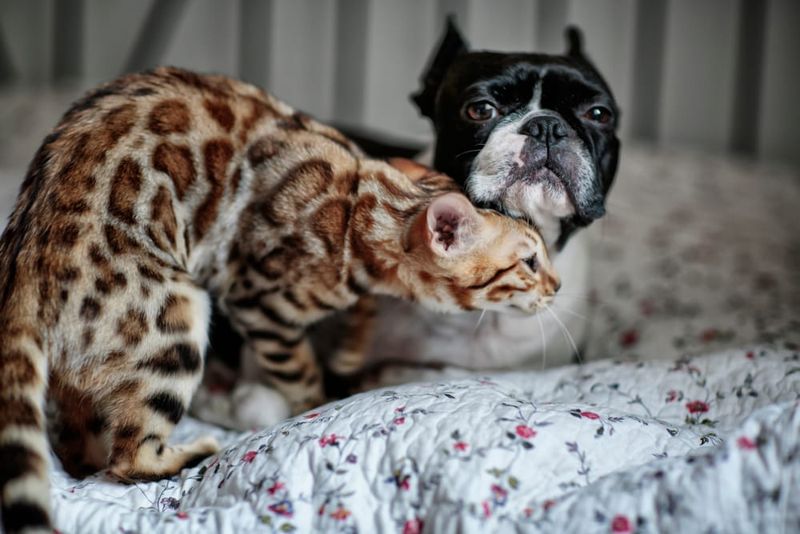
Boston Terriers, with their lively and friendly demeanor, often adapt well to living with cats. Their gentle playfulness can lead to engaging interactions with feline friends.
These dogs are known for their intelligence and adaptability, making them suitable companions in a multi-pet home. With proper socialization, they can form lasting bonds with cats.
Fun fact: Boston Terriers are nicknamed “American Gentlemen” due to their tuxedo-like coat markings and refined manners.
English Mastiff
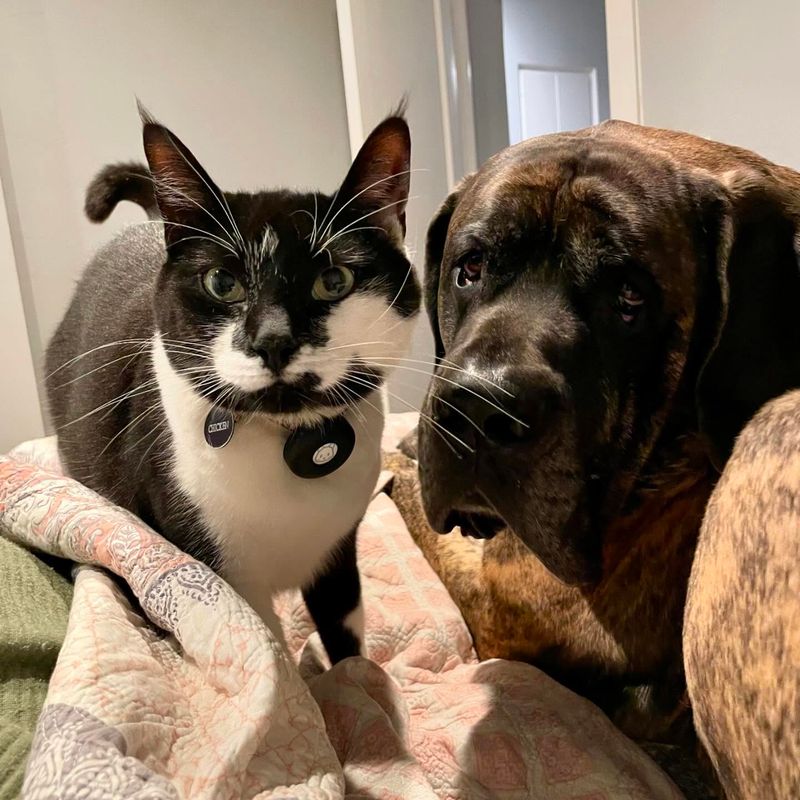
English Mastiffs are renowned as gentle giants, known for their calm and protective nature. These traits often lead to successful coexistence with cats.
Their size might be intimidating, but their gentle disposition and affection can make them ideal companions in a multi-pet household. Cats often find comfort in their steady presence.
Did you know? Mastiffs have a history dating back to ancient civilizations, often used as war dogs due to their strength and loyalty.
Newfoundland

With a heart as expansive as its size, the Newfoundland is a gentle guardian, often forming strong bonds with cats. Their nurturing nature shines in a shared home.
These dogs are known for their patient and kind disposition, traits that make them ideal companions for feline friends seeking a protective buddy.
Fun fact: Newfoundlands are excellent swimmers, originally bred for water rescues, showcasing their strength and dedication.
Doberman Pinscher
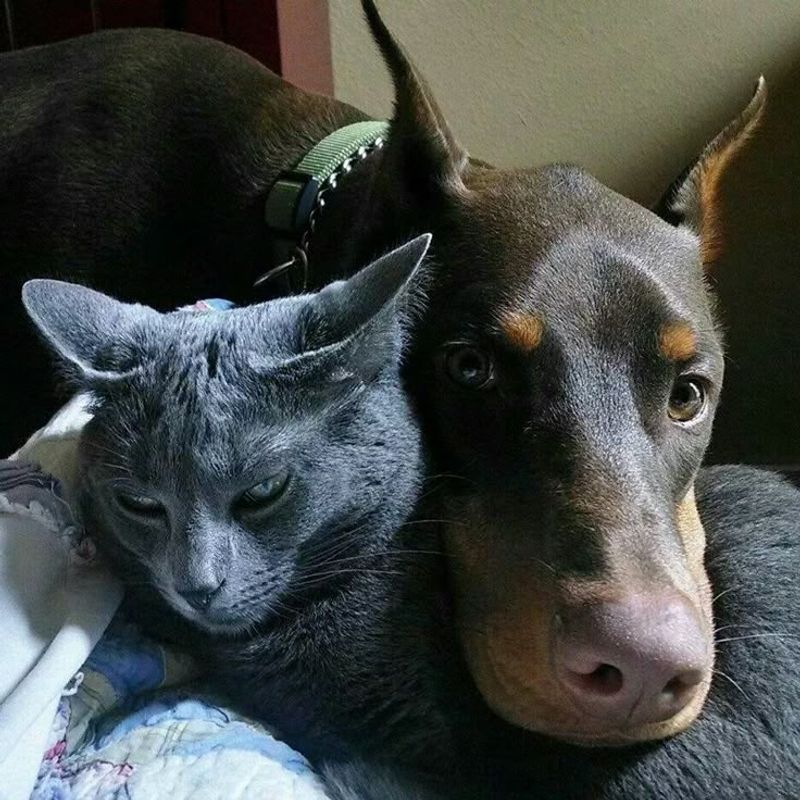
Doberman Pinschers, known for their loyalty and intelligence, can form protective bonds with cats. Their strong presence can offer a sense of security in a shared home.
With proper training and socialization, these dogs often become gentle companions, providing a balanced dynamic with feline housemates.
Did you know? Dobermans were originally bred by a tax collector in Germany, valued for their guarding abilities and sharp intelligence.
Bernese Mountain Dog
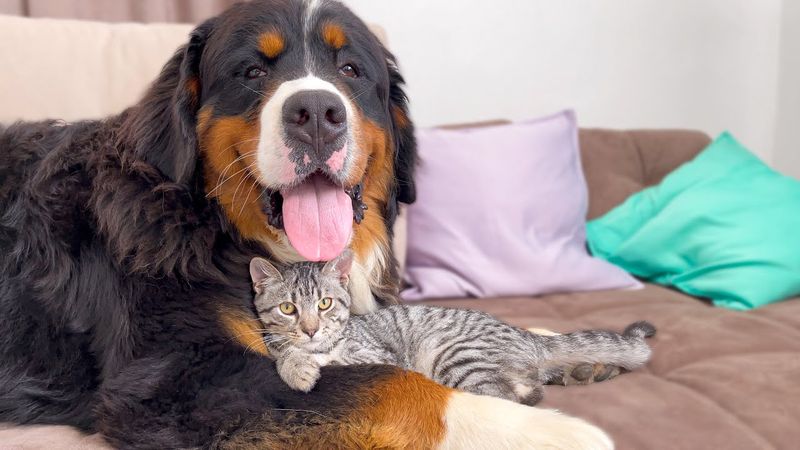
Bernese Mountain Dogs are known for their calm and friendly demeanor, often thriving in homes with cats. Their gentle nature and patience make them excellent companions.
These dogs are typically good-natured and affectionate, which can lead to harmonious relationships with feline housemates. Their large size is paired with a tender-hearted approach.
Fun fact: Bernese Mountain Dogs were originally bred in Switzerland for farm work, revered for their strength and loyalty.
Cocker Spaniel
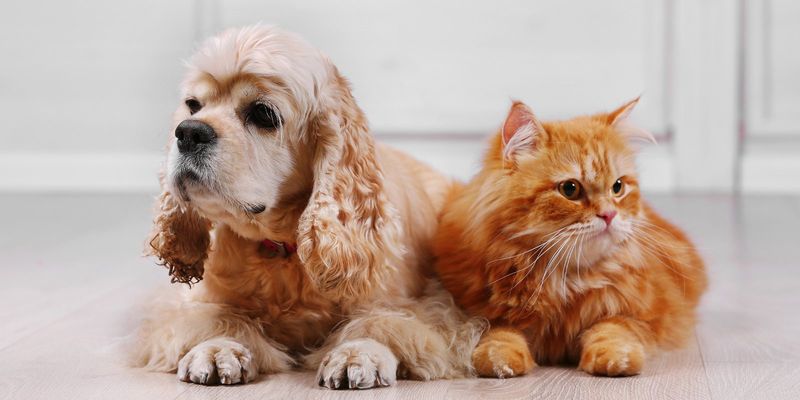
Cocker Spaniels, with their friendly and sociable nature, often integrate well into homes with cats. Their amiable disposition encourages positive interactions.
These dogs are known for their playful spirit, which can lead to delightful companionship with a feline friend. With positive introductions, they can share joyous moments.
Did you know? Cocker Spaniels were bred as hunting dogs in England, skilled at flushing game from dense cover.
Great Dane
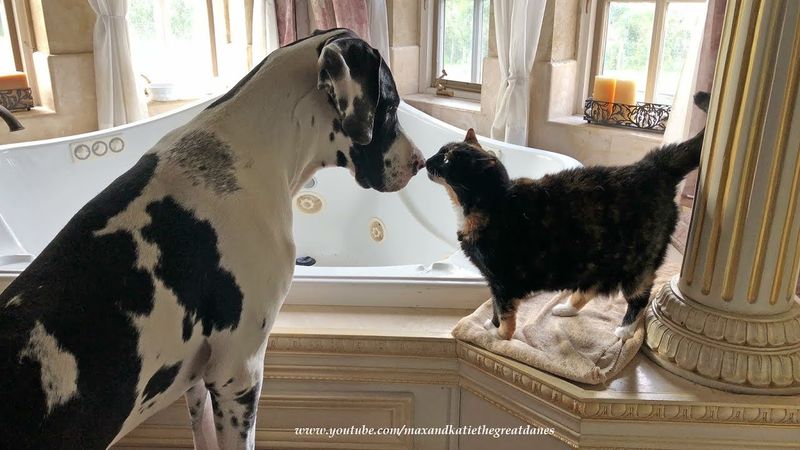
Despite their impressive size, Great Danes are known for their gentle and friendly nature. These qualities often lead to successful cohabitation with cats, providing a gentle giant presence in the home.
Their calm demeanor and patient outlook can lead to unique friendships with feline housemates, forming bonds that transcend size differences.
Fun fact: Great Danes were originally bred in Germany as hunting and guard dogs, known for their height and elegance.
Basenji
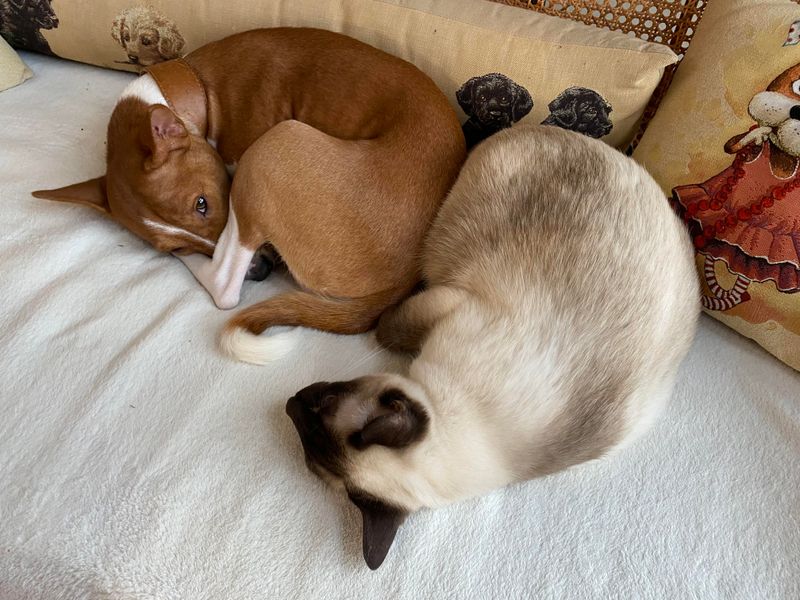
Known as the “barkless dog,” the Basenji is quite the character. This breed is intelligent and curious, often surveying its surroundings with a keen eye. Despite its quiet demeanor, the Basenji is energetic and requires ample exercise.
Basenjis can be aloof with other animals, making them a challenging breed to pair with cats. They have a strong prey drive which can lead to a chase if not properly managed.
Without early socialization, the Basenji may struggle to adapt to feline roommates. Careful introductions and monitoring are essential for harmony.
Bichon Frise
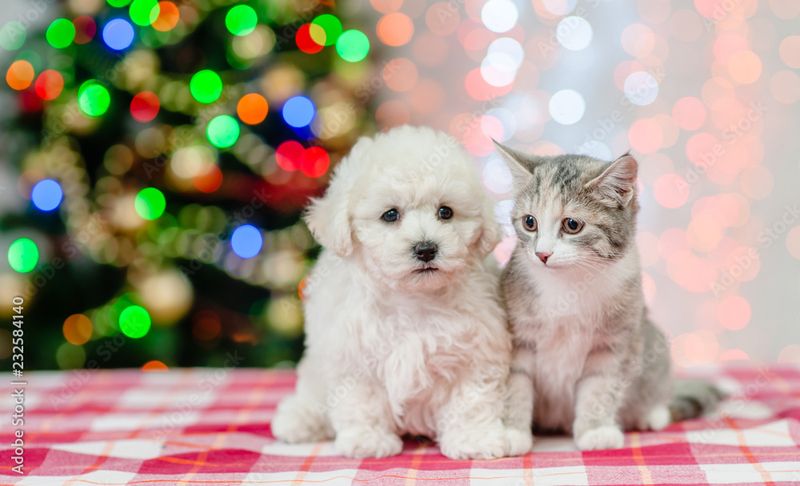
With its fluffy white coat and joyful demeanor, the Bichon Frise is a breed that often thrives in a multi-pet household. These dogs are typically cheerful and affectionate, showing a friendly attitude towards both humans and their feline housemates.
The Bichon Frise’s playful nature allows it to get along well with cats that enjoy similar levels of activity. Their gentle disposition and tendency to avoid confrontation make them a wonderful addition to a home looking for harmony between dogs and cats.

